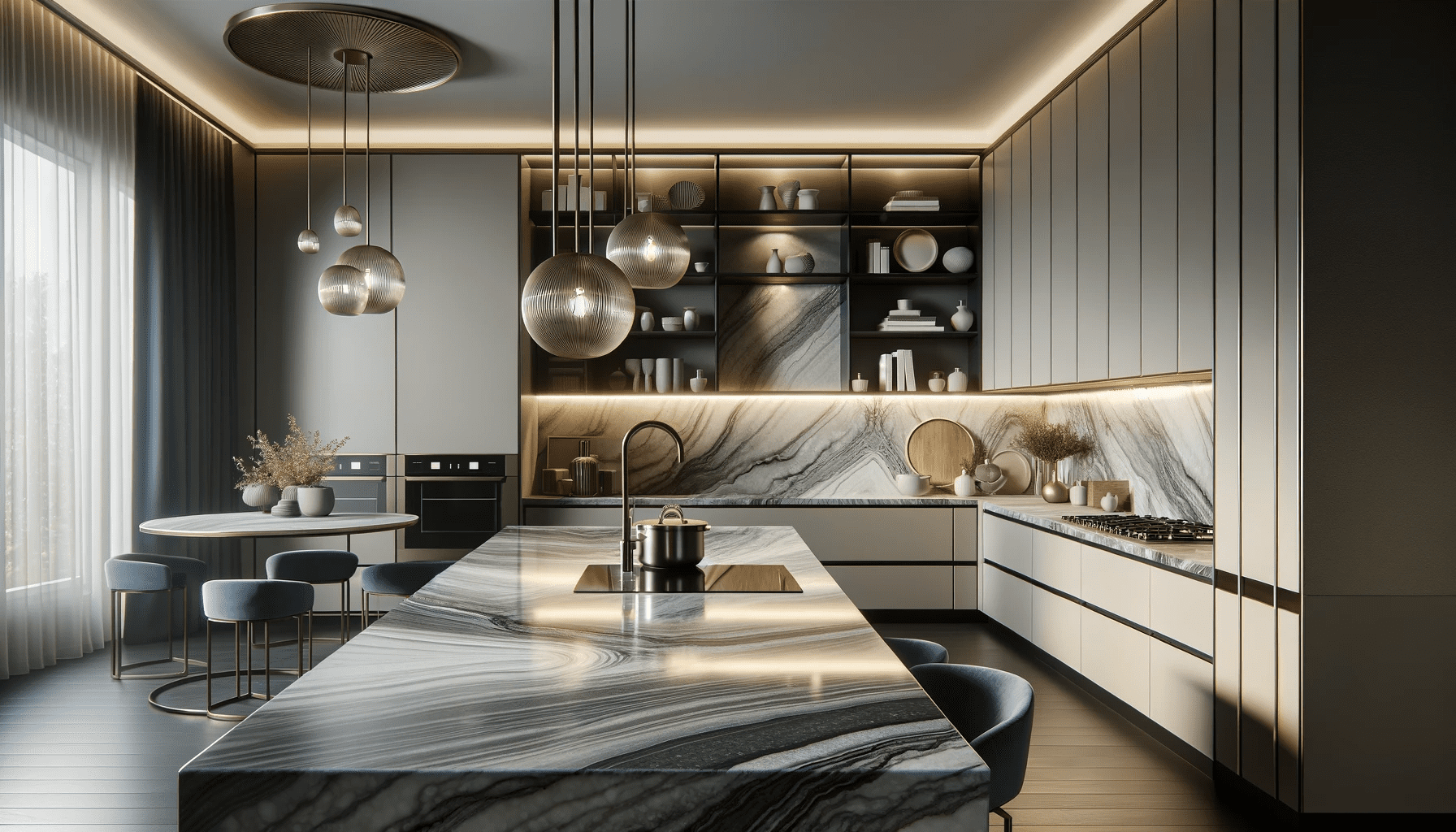In the world of interior design, the quest for a blend of luxury and functionality often leads homeowners and designers to engineered stone worktops. Renowned for their durability and stunning resemblance to natural stone, these worktops have become a staple in high-end kitchen and bathroom designs. For Excel Marble in the UK, specializing in worktops, splashbacks, and kitchen islands, the versatility of engineered stone – especially materials like quartz – is a key element in crafting luxurious spaces.
Understanding Engineered Stone
Engineered stone is a composite material made of crushed stone bound together by an adhesive (most commonly polymer resin). The most popular type of engineered stone is quartz, which combines the beauty of natural stone with enhanced practical qualities.
The Manufacturing Process
The process of creating engineered stone involves mixing approximately 90% ground natural quartz with resins, polymers, and pigments. This mixture is then poured into molds and formed into slabs, which are compressed under intense pressure and heat, resulting in a non-porous, strong slab.
Advantages Over Natural Stone
One of the key advantages of engineered stone is its non-porous nature, which makes it resistant to stains and scratches, and also hygienic – an essential feature for kitchen and bathroom surfaces. Additionally, unlike natural stone, it doesn’t require regular sealing.
Design Flexibility with Engineered Stone
Engineered stone comes in a wide range of colors and patterns, some of which are difficult to find in natural stone. This variety allows for greater design flexibility, enabling homeowners and designers to achieve a specific look, whether it’s mimicking natural marble or presenting a uniquely modern appearance.
Color Consistency
Unlike natural stone, which can vary greatly from slab to slab, engineered stone offers consistency in color and pattern. This feature is particularly beneficial when covering large areas, such as kitchen worktops and islands, as it ensures a uniform appearance.
Customization Options
The manufacturing process of engineered stone allows for a variety of finishes and edges. From polished to honed, and beveled to bullnose edges, the customization possibilities are vast, catering to a range of design preferences.
The Role of Engineered Stone in Luxury Design
Creating a Statement Piece
In luxury design, the kitchen worktop often serves as a statement piece. Engineered stone, especially when used in larger, uninterrupted slabs, can create a visually striking centerpiece in the kitchen, reflecting elegance and sophistication.
Combining with Other Elements
Engineered stone worktops can be seamlessly integrated with other luxury elements such as high-end appliances, custom cabinetry, and designer lighting. This integration enhances the overall luxurious feel of the space.
Durability Meets Style
Luxury doesn’t just mean good looks; it also means quality and longevity. Engineered stone offers a practical solution for busy kitchens and bathrooms where durability is as important as style.
Practical Considerations for Engineered Stone Worktops
While engineered stone worktops are durable, they are not indestructible. It is important to avoid direct heat exposure and to use cutting boards to prevent potential damage. Despite these considerations, their maintenance is relatively straightforward, requiring just soap and water for cleaning.
The Luxurious Choice of Engineered Stone
Engineered stone worktops offer a perfect blend of beauty, durability, and low maintenance, making them an ideal choice for those looking to achieve a luxurious aesthetic in their homes. At Excel Marble, we understand the importance of quality and style, and our range of engineered stone options is designed to meet the diverse needs of our clients.
FAQs
What is the main difference between quartz and natural stone?
Quartz is engineered and more uniform in appearance, while natural stone is completely natural and can vary in pattern and color.
Can engineered stone withstand high temperatures?
While it is heat resistant, it’s advisable to use trivets or heat pads to protect the surface from direct heat.
Is engineered stone more affordable than natural stone?
The cost can vary, but generally, engineered stone is comparably priced to natural stone, with the added benefit of lower maintenance.
Can engineered stone be used in outdoor kitchens?
It’s not recommended for outdoor use as UV rays can cause discoloration over time.
How do I maintain my engineered stone worktop?
Regular cleaning with soap and water is sufficient. Avoid harsh chemicals and abrasive cleaners.
Is engineered stone environmentally friendly?
It’s a more sustainable option as it uses waste stone and requires less quarrying compared to natural stone.
Can engineered stone replicate the look of marble or granite?
Yes, it can be manufactured to closely mimic the appearance of natural stones like marble and granite.
Are there limitations in the size of engineered stone slabs?
Engineered stone slabs do have size limitations, but they generally accommodate most kitchen layouts.
Can I cut directly on my engineered stone worktop?
It’s advisable to use a cutting board to prevent scratches and maintain the integrity of the surface.
How long do engineered stone worktops last?
With proper care, they can last many years, often as long as the lifespan of the home itself.



